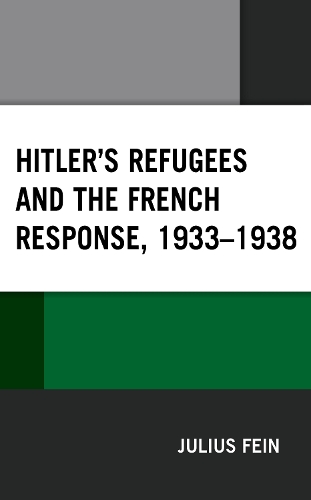
Hitler's Refugees and the French Response, 19331938
(Hardback)
Publishing Details
Hitler's Refugees and the French Response, 19331938
By (Author) Julius Fein
Bloomsbury Publishing PLC
Lexington Books
1st March 2021
United States
Classifications
Professional and Scholarly
Non Fiction
General and world history
Central / national / federal government policies
Migration, immigration and emigration
325.2109430944
Physical Properties
Hardback
322
Width 161mm, Height 241mm, Spine 24mm
594g
Description
Julius George Stephen Fein examines the French response to the large number of German refugees between 1933 to 1938. Fein demonstrates how the Quai dOrsay sought a compromise between the Republican canon which said France must help the persecuted and the factors which limited its willingness to accept refugees, including economic depression, anti-Semitism, anti-German sentiment, and mass unemployment.
Reviews
Julius George Stephen Fein has produced a meticulously researched, balanced, and authoritative analysis of French policy towards refugees from Nazi Germany before the outbreak of the Second World War. He also tells a moving story, not least because of his examination of the refugees themselves.
-- David Stevenson, London School of Economics and Political ScienceThis book has excellent internal insight on how the French state reacted towards the influx of refugees from Nazi Germany in the 1930s. Fein shows us that the French Ministry of Foreign Affairs was an important actor not only in protecting refugees in France, but also in securing an international refugee regimea regime which left us with concepts, such as country of first settlement and non-refoulement, essential to contemporary refugee policy.
-- Frank Caestecker, University of GhentFein has written an extraordinary book on an extraordinary subject: the willingness of the French alone among the Western democracies to accept large numbers of Jewish refugees from Germany in the 1930s. It is a book that not only examines a vital episode in the history of migrants and the judicial, racial, ideological and economic reactions to them, but which also casts interwar France in a better light than is usual in history books covering this period. Fein is to be congratulated for producing a highly original, superbly researched, and well-written study.
-- Alan Sked, professor emeritus, London School of Economics and PoliticsHow to resolve the migrant problem This question, current today, had already arisen in the 1930s in connection with the German Jews fleeing the Nazi regime. Thanks to a vast amount of well-mastered documentation, Fein describes the attitude of France, and in particular of the Quai dOrsay, to the arrival of these immigrants between 1933 and 1938. This original approach to a delicate problemhow to reconcile the ideals of human rights with the political realityis handled with skill and common sense. It is a success.
-- Maurice Vasse, professor emeritus, Paris Institute of Political StudiesI was delighted to be able to give Fein access to my great-grandfather Louis Oungres archives and to be able to contribute to this duty of remembrance which seems essential to me. Immigration is at the heart of Europe's concerns today, proof that history is repeating itself and that it is important to be aware of it. Congratulations to Fein for his accomplished work.
-- Virginie Tissini, great-granddaughter of Louis OungreAuthor Bio
Julius George Stephen Fein is an independent scholar.
